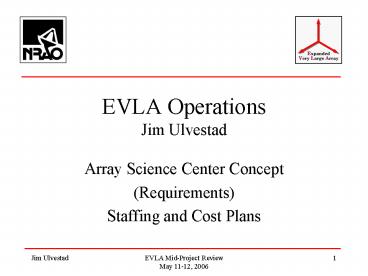EVLA Mid-Project Review - PowerPoint PPT Presentation
Title:
EVLA Mid-Project Review
Description:
EVLA MidProject Review – PowerPoint PPT presentation
Number of Views:19
Avg rating:3.0/5.0
Title: EVLA Mid-Project Review
1
EVLA OperationsJim Ulvestad
- Array Science Center Concept
- (Requirements)
- Staffing and Cost Plans
2
Array Science Center Vision
- ALMA is raising the bar on expectations for data
delivery and science support for all astronomers - Such a vision was not clearly defined at the time
of initial EVLA proposal in 2000 - All NRAO telescopes should provide similar levels
of services - Array Science Center for EVLA/VLBA will play a
scientific leadership role in cm-wavelength
astronomy - Algorithm hardware development, science
research support, visitor programs, engagement
with community in planning future programs - Challenge Carry out an Array Science Center
development without breaking the bank!
3
Science Center Requirements
- Enable non-radio astronomers to carry out
observations that reach their science goals - Provide calibrated data reference images for
most observations, and science-quality images for
standard modes, with on-line archive - Support transportable post-processing package,
plus in-house capability to process the most
demanding observations - Provide expert scientific staff in supportive
research environment - Fund page-charge support, meetings, postdocs,
visitor program - Provide instrument renewal budget and associated
teams - Provide research grants, up to level recommended
by decadal panel - Operate Education Center (separate funding for
construction)
4
Operations Personnel Summary
Function FTE (2000) FTE (2012)
Array Science Center 30 62
Assistant Directors Office 5 4
Business Services 9.5 8
Array/Correlator Operations 25 19
Electronics 73 65
Engineering Services 52 48
Computing Infrastructure 9.5 10
Operational Software 9 11
(Education Center) (1.5) (8.5)
TOTAL (without Education Center) 213 227
5
Operations Personnel Plan, 2006-2012
- Exclusive of full Array Science Center (annual
increments not yet staged for ASC)
Year FTEs Comment
FY06 171 Current value
FY07 176 EVLA scientific commissioning
FY08 185 Commissioning CASA to Ops
FY09 190 Carpentry, painting at VLA
FY10 192 EVLA Computing to Ops S/W
FY11 194
FY12 195 Baseline science support only
6
Total EVLA/VLBA Ops Costs (FY03 )
Function 2000 (03) 2012 (03) 2012 (12)
Personnel -- nominal science support (213 FTEs in 2000, 195 FTEs in 2012) 14.9M 13.6M 18.5M
MS, facilities, power, travel 4.2M 5.0M 6.8M
Subtotal -- present science support 19.1M 18.6M 25.3M
Science Center Added Personnel 0M 3.1M 4.2M
Science Center Added Costs 0M gt2.8M gt3.8M
Grants 0M ?? ??
Subtotal Science Center extras 0M gt5.9M gt8.0M
TOTAL 19.1M gt24.5M gt33.3M
7
Routine Operations Requirements
- Operate both EVLA and VLBA, with associated gains
in cost efficiency - Maintain EVLA capability until 2030
- Retain all 7 configurations (A,B,C,D hybrids)
- 95 reliability in scheduled antenna-hours
- 70 of hours in year for peer-reviewed science
- 1-50 GHz and 327 MHz bands available year-round
- Primary dynamic scheduling, with fixed
observations also possible
8
Array Science Center Personnel
Function FTE (2000) FTE (2012)
Mgmt/Admin 2 6
EVLA/VLBA Sci. Support 13 9
User Support Services 3 6
Post-Processing Algorithms 10 9
Pipeline/Archiving/Computing 0 6
Data Services 2 9
Software Support/Testing 0 2
Postdocs/visitors 0 8
H/W Development New Initiatives 0 7
TOTAL 30 62
9
Annual Ops/Infrastructure Costs
- All costs in dollars of year (FY05 for 2005,
FY12 for 2012 costs) - FY05 cost includes pro-rated share of past
infrastructure augmentations (FY05 direct budget
totaled 4.0M)
Function Cost (2005) Cost (2012)
MS, Facilities, Travel 3.2M 3.9M
EVLA Power 0.6M 1.6M
AOC Power 0.3M 0.5M
VLBA Power 0.4M 0.7M
Added VLA-AOC Bandwidth 0.0M 0.1M
TOTAL 4.5M 6.8M
10
Additional Array Science Center Costs
Activity Annual Cost (FY12)
Archive Storage/Bandwidth 0.2M
Computing H/W 0.1M
Page Charges 0.17M
Visitor Travel 0.24M
EVLA Meeting 0.05M
Instrument Renewal 3M-5M
Grants ??
Education Center 0.0M
TOTAL 3.8M-5.8M grants































